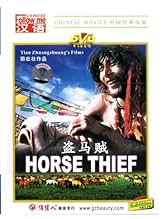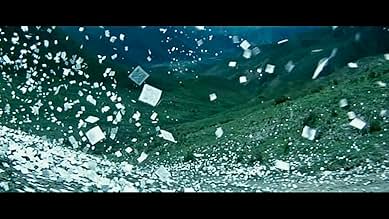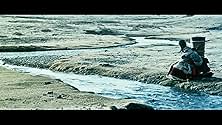AVALIAÇÃO DA IMDb
6,8/10
1,6 mil
SUA AVALIAÇÃO
Adicionar um enredo no seu idiomaA Tibetan man struggles to provide for his family.A Tibetan man struggles to provide for his family.A Tibetan man struggles to provide for his family.
- Prêmios
- 1 vitória no total
Enredo
Você sabia?
- CuriosidadesNumber 1 on Martin Scorsese's top 10 movies of the 90s list, which he presented on a special episode of At the Movies with Roger Ebert. Even though the movie was made and released in the 80s, it gain traction in the US during the 90s.
- ConexõesFeatured in Siskel & Ebert & the Movies: Best of the '90s (2000)
Avaliação em destaque
Set in 1923 against the breathtaking Tibetan landscape, The Horse Thief describes the retribution visited upon a clan member who is stealing horses. With minimal plot or dialogue, it is essentially a meditation on the Tibetan's struggle for survival in a harsh and uncompromising environment. The film dramatizes both the everyday occurrences and the religious rituals that are part of the fabric of Tibetan life.
The simple tale involves Norbu (Rigzin Tseshang), a member of a clan, who is accused of stealing horses and temple goods to support his wife Dolma (Jiji Dan) and their adored young son Tashi (Jamco Jayang). To keep the clan cleansed of evil, Norbu and his family are ostracized and banished to assume the life of wanderers. Norbu and his family leave the clan but do not renounce their faith. Appealing for divine intervention to keep them alive, the family engages in Buddhist rituals such as turning the prayer wheels, masked ceremonial dances, and prostration to Buddha.
Ultimately, their nomadic existence takes a grim personal toll. At the point of starvation, Norbu has to eat the newly fallen snow to give him strength, and is forced to resume stealing to save his family from the cold winter. The conclusion is stunning in its elemental power.
Though I was deeply moved by Tian's despairing vision and awed by the film's gorgeous cinematography, I found The Horse Thief to be quite demanding to watch. The film moves very slowly with long, static shots during which the camera remains fixed for several minutes. Also, being unfamiliar with Tibetan culture, I sought more explanation of the significance of some rituals, for example, the grazing of sacred sheep and the dances using ceremonial masks. I feel, however, that The Horse Thief transcends specific cultural limitations and achieves a universal quality in its depiction of the importance of faith and the strength of family.
I would have liked to have seen The Horse Thief in the theater, and hear it spoken in the original Tibetan language (it was dubbed into Mandarin). Nonetheless, I am grateful for having received this authentic insight into Tibetan culture, something that is uncommon in these days of Chinese occupation. Watching this film was almost a furtive experience, like stealing a glimpse into a beautiful and haunting secret world and rediscovering what it means to be human.
The simple tale involves Norbu (Rigzin Tseshang), a member of a clan, who is accused of stealing horses and temple goods to support his wife Dolma (Jiji Dan) and their adored young son Tashi (Jamco Jayang). To keep the clan cleansed of evil, Norbu and his family are ostracized and banished to assume the life of wanderers. Norbu and his family leave the clan but do not renounce their faith. Appealing for divine intervention to keep them alive, the family engages in Buddhist rituals such as turning the prayer wheels, masked ceremonial dances, and prostration to Buddha.
Ultimately, their nomadic existence takes a grim personal toll. At the point of starvation, Norbu has to eat the newly fallen snow to give him strength, and is forced to resume stealing to save his family from the cold winter. The conclusion is stunning in its elemental power.
Though I was deeply moved by Tian's despairing vision and awed by the film's gorgeous cinematography, I found The Horse Thief to be quite demanding to watch. The film moves very slowly with long, static shots during which the camera remains fixed for several minutes. Also, being unfamiliar with Tibetan culture, I sought more explanation of the significance of some rituals, for example, the grazing of sacred sheep and the dances using ceremonial masks. I feel, however, that The Horse Thief transcends specific cultural limitations and achieves a universal quality in its depiction of the importance of faith and the strength of family.
I would have liked to have seen The Horse Thief in the theater, and hear it spoken in the original Tibetan language (it was dubbed into Mandarin). Nonetheless, I am grateful for having received this authentic insight into Tibetan culture, something that is uncommon in these days of Chinese occupation. Watching this film was almost a furtive experience, like stealing a glimpse into a beautiful and haunting secret world and rediscovering what it means to be human.
- howard.schumann
- 25 de ago. de 2002
- Link permanente
Principais escolhas
Faça login para avaliar e ver a lista de recomendações personalizadas
- How long is The Horse Thief?Fornecido pela Alexa
Detalhes
- Data de lançamento
- País de origem
- Central de atendimento oficial
- Idiomas
- Também conhecido como
- The Horse Thief
- Locações de filme
- Empresa de produção
- Consulte mais créditos da empresa na IMDbPro
Contribua para esta página
Sugerir uma alteração ou adicionar conteúdo ausente

Principal brecha
By what name was O Ladrão de Cavalos (1986) officially released in India in English?
Responda


















